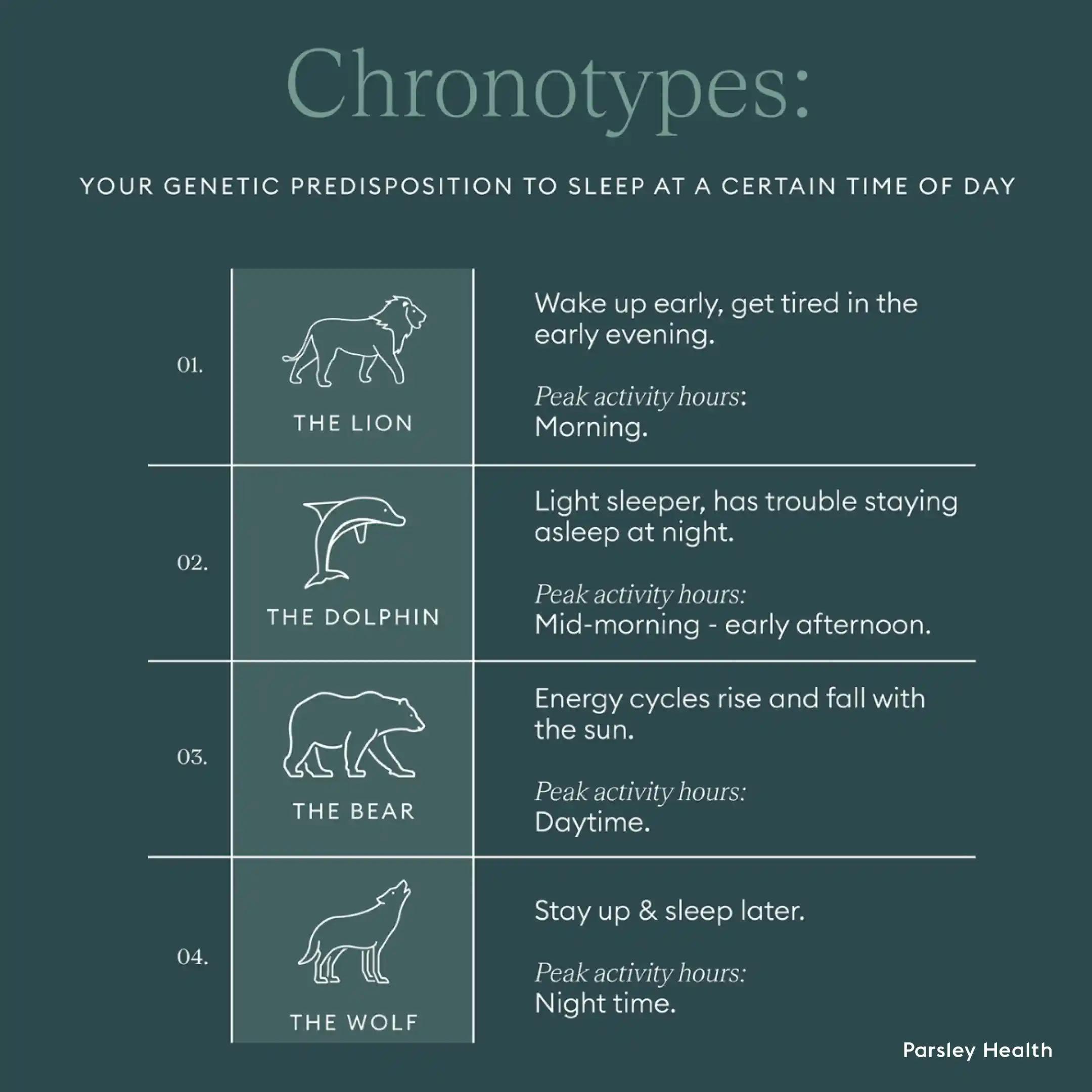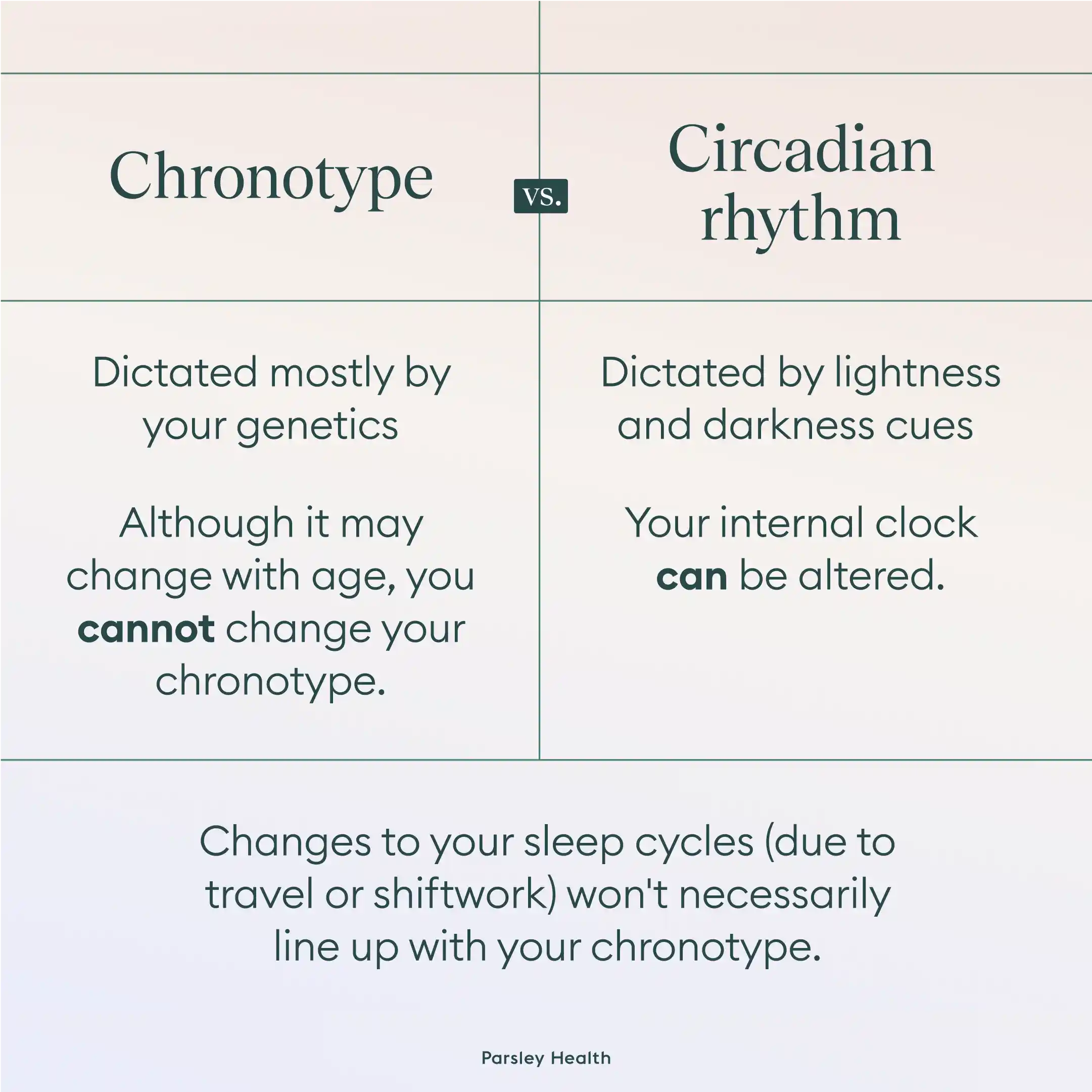This article has been medically reviewed by Nisha Chellam, MD. It contains additional reporting by Jennifer Chesak.
If you’ve ever wondered why you can pop out of bed at the crack of dawn with no issue while your partner or friend prefers to sleep until mid-morning, science has a reason. Meet your sleep chronotype.
Sleep chronotypes are people's natural proclivity for when they go to sleep and wake up. You've likely heard of the proverbial phrases "morning lark" and "night owl." But these categories don't fit everyone. That's why researchers have come up with four distinct chronotypes.
Your chronotype informs more than just your sleep and wake times. It also plays a role in when you have the most energy and focus and when you might feel an energy slump.

Knowing your chronotype and working with it rather than against it can help you biohack for better sleep, productivity, and more.
What are the different chronotypes, and what do they mean?
As you might have guessed, chronotypes fall on a spectrum with the proverbial morning larks and night owls on the extreme ends, says Christina Kang, a certified health coach.
Some people like waking up early and are most productive during earlier parts of the day. These folks fall into the morning chronotypes category. Others prefer to sleep in. They thrive in the afternoon and evening. These folks fit into the evening chronotypes categories.
“Some evidence suggests that morning chronotypes are associated with shorter circadian-rhythm periods—less than 24 hours—while evening chronotypes may have circadian periods longer than 24.2 hours,” Kang says. That means not everyone’s body naturally follows a 24-hour cycle.
Sleep onset, body temperature, and melatonin markers for sleep may be two to three hours later for evening chronotypes than morning chronotypes.
With their delayed alertness and sleepiness rhythms, evening chronotypes can stay up later. Morning chronotypes often start to experience sleepiness in the middle of the day, while evening chronotypes start feeling sleepy around nine hours later in the evening.
Rather than sticking with the themes of morning lark and night owl, Michael J. Breus, PhD, clinical psychologist and sleep doctor, wrote a book called The Power of When, in which he describes chronotypes as animals. His chronotypes account for those who don't quit fit the lark or owl schedules.
Which chronotype are you?
Dolphins are light sleepers and tend to have trouble staying asleep. Some may have insomnia. Their peak productivity hours are in the mid-morning to early afternoon.
Lions wake up early and have their peak productivity hours in the morning. They tend to get tired in the early evening.
Bears have energy cycles that rise and fall with the sun, and they are most productive in the daytime.
Wolves stay up and sleep later. They typically go to bed around midnight or after and like to sleep in.
Read on for how to embrace your chronytpe for better sleep and productivity.
Can your environment and lifestyle influence your chronotype?
Your chronotype is mostly determined by your genetics rather than environmental factors.
“Twin and family studies have shown that chronotype is a heritable gene," Kang says.
Epigenetics—turning genes on or off due to environmental factors—can contribute to your chronotype too, Kang says, but it’s still an area of research that needs more study.
“For example, we know that chronotype does change with age, even though your genes don’t change," King says. "Older adults trend towards morningness,” Kang says.
Children tend to be morning chronotypes too, and teenagers and young adults trend toward evening. This is due to epigenetic changes to their circadian rhythms which are closely tied to chronotypes.
That said, age, social cues, and where you live can also influence your chronotype, Kang says. “Light and darkness are the most powerful zeitgebers, or time givers," she adds, "which are environmental cues to entrain our body’s circadian rhythm,” she explains.
A May 2018 study in The Journal of Biological and Medical Rhythm Research looked at the chronotype of young adults between 17 and 26 years old. The results suggest that having a later chronotype is associated with spending more time outside later in the day, waking up after sunrise and living farther from the equator.
The study also found that people who live where the sun rises and sets later may experience later release of melatonin, a hormone associated with our sleep-wake cycles. Therefore, they may be more likely to have an evening chronotype.
However, the study followed younger adults in school, so their light exposure differs greatly from other adults with different work schedules, which can affect circadian rhythm.
Some studies also show that the seasons and season in which you were born may slightly affect your chronotype.
How your chronotype can affect your health and sleep
Because your chronotype determines when you’re most alert or when you’re starting to feel sleepy, it affects your health.
“For example, if you don’t have time to exercise during your peak energy periods, you may not be motivated to exercise at all,” Kang says.
Midday or evening chronotypes might find morning physical activity to be particularly challenging, so they may hold off until later in the day. However, work, school, or family obligations could interfere. Skipping exercise altogether can increase your risk for heart disease, Type 2 diabetes, and other health conditions.
Those with an evening chronotype may already have a higher risk of poor cardiovascular health, when compared to those with morning or intermediate chronotypes, according to a 2020 study.
A 2013 study found that those with evening chronotypes have more than double the risk for Type 2 diabetes and 1.3 more times the risk for hypertension, when compared to those with morning chronotypes.
Many of society’s structures around work and school favor morning over evening chronotypes. “Our professional and academic culture is architected against the evening chronotype," Kang says. "Therefore, evening types may be negatively impacted in terms of performance." As a result, many evening chronotypes tend to struggle with adapting to a work environment that calls for earlier hours.
“Evening chronotypes seem to have greater propensity for mental illness and tendency towards depression, bipolar disorder, and anxiety,” Kang adds.
A 2017 study included 1,227 people diagnosed with clinical depression. The researchers found that depression and anxiety were more prevalent in evening chronotypes than morning chronotypes.
Those with late chronotypes were also more likely to be younger, unemployed, current smokers, and have greater alcohol use than other chronotypes. In contrast, research has shown that morning chronotypes tend to have more feelings of optimism and happiness than evening chronotypes.
If you’re an evening chronotype, these studies might raise some red flags, but they don’t show an entirely accurate picture. Many other variables also play a role in whether someone will develop depression or anxiety. These studies don’t consider socioeconomic and health factors that can contribute.
“Trying to control for all of these variables is a herculean challenge, so the studies should be interpreted with caution,” Kang says.

Circadian rhythm vs chronotype
Your chronotype is not the same as your circadian rhythm, but they have some connections.
Chronotype is dictated mostly by your genetics, and although it may change with age, you cannot change your chronotype.
Circadian rhythm regulates your sleep-wake cycle, which is influenced by lightness and darkness cues. Your internal clock can be altered. But changes to your sleep cycles (due to travel or shiftwork) won't necessarily line up with your chronotype.
If you’re having trouble finding your ideal sleep window or syncing your behavior up to your chronotype, a Parsley Health provider can help you adjust your lifestyle to take advantage of your chronotype.
Sleeping tips for each chronotype
The first step to working with your chronotype instead of against it is to determine your chronotype.
Take Dr. Breus's chronotype quiz to find out which chronotype you are.
Next, follow these tips for finding your optimal sleep schedule, for improving your sleep quality, and for harnessing your most productive times of day.
Dolphin
About 10 percent of the population fits the dolphin chronotype. But it can be a tough one for finding the perfect schedule. Here are some helpful guidelines, but you will need to find what works best for you.
Sleep schedule
Your best sleep schedule likely involves going to bed at about 11:30 p.m. and waking up around 6:30 a.m.
Sleep tips
Dolphins often have trouble falling asleep, and they are light sleepers. Give your body time to ease into sleep with a regular sleep-prep routine, and aim to minimize light pollution, noise pollution, and other sleep disruptors.
Productivity time
You'll likely find that the best time to splash into important tasks is between 10 a.m. and 2 p.m. But your energy levels may fluctuate during this time with a good peak around noon. You may also get a second energy surge in the evening.
Lion
About 15 percent of people match the lion chronotype. Lions like to roar after the day early.
Sleep schedule
Your best sleep schedule will likely involve going to bed by 10 p.m. For waking, aim for 5:30 a.m., but earlier is fine, depending on when you conk out the night before.
Sleep tips
You'll probably feel sleepy earlier than others around you who aren't "morning people." That's OK. Set boundaries around your slumber. In the wee hours of the a.m., you may find yourself waking up. Keep your room dark to prevent waking too early.
Productivity time
You're going to be most productive before noon. If you need to boost your energy a little later, physical activity can help.
Bear
Of all the chronotypes, the bear is the most common, with 55 percent of people matching it. This may be because the bear chronotype matches up the most with lightness and darkness cues.
Sleep schedule
Bears do well with a bedtime of 11 p.m. and a wake time of 7. a.m.
Sleep tips
Bears like a little extra time to prepare for their evening hibernation. So set up a good sleep routine to signal to your body that bedtime is approaching.
Productivity time
Bears have a lot of midday energy. So those hours between 10 a.m. and 1 p.m. are when to claw after big tasks. You might feel your energy drop mid-afternoon. If so, get up and move around to keep your momentum going.
Wolf
About 15 percent of people fit the wolf chronotype. Wolves get their energy surge as the day progresses.
Sleep schedule
Wolf-types do best with a bedtime of midnight and wake time of about 7:30 a.m.
Sleep tips
You may take extra time to wake up in the morning and get your energy engine going. That might mean setting an initial alarm and then drifting in and out of sleep a bit before you get up. Although howling even later than midnight may be tempting for the wolf, doing so might make your morning more difficult.
Productivity time
Wolves have a strong productivity window of 2 p.m. to 6 p.m. You can still be productive earlier in the day. Just use those pre-noon hours to ease you into any heavier tasks.
More tips for working with your chronotype
Once you figure out your chronotype, Kang says to embrace and own it as much as possible. Try to sync your behavior and lifestyle with your chronotype.
Wolves, for example, will need to structure their days differently than lions. Lion chronotypes will want to tackle their deep work as soon as they clock in for the day and save the easier tasks, like going through their inbox, for later. Wolves, on the other hand, may want to reverse that strategy.
Practice good sleep hygiene
No matter which chronotype you are, ensure you’re getting enough quality sleep. Doing so starts with practicing good habits.
Avoid screens, such as your smartphone and the TV, one to two hours before bed to prevent impairing the release of melatonin.
In the morning, Kang says to get direct sunlight within 30 minutes of waking up.
Align your activities with your chronotype
Kang recommends syncing activities, like exercising, with your chronotype to keep motivation high.
For example, bear and dolphin chronotypes may have two times to choose from for physical activity: shortly after waking or just after work. But lion and bear chronotypes will do best with morning physical activity and evening physical activity, respectively.
Work with your partner
If your sleep partner has a different chronotype than you, Kang recommends considering using ear plugs, a white noise machine, and an eye mask to prevent sleep disruptions.
If these techniques don’t work, a sleep divorce, which is sleeping in different rooms, can also help. “This doesn’t have to be an all-or-nothing approach," Kang says. "Try a few nights and see how it goes."
FAQ
What are the four chronotypes of sleep?
The four sleep chronotypes are dolphin, lion, wolf, and bear.
How do you determine your sleep chronotype?
The researcher who developed the four sleep chronotypes, Michael Breus, Ph.D., has a quiz for how you can determine yours.
Is sleep chronotype legit?
Yes, the concept of sleep chronotypes has been rigorously researched. Knowing your sleep chronotype can help you tailor your schedule for better sleep, productivity, and health.
What is the rarest sleep chronotype?
Only about 10 percent of people fit the dolphin chronotype, making it the rarest.
How do you change your sleep chronotype?
Your genetics dictate your chronotype, and therefore you cannot change it.

